
Mari Agory, Mari Malek, Grace Bol, Rina Kara, Elizabeth Arjok, Nyamouch Girwath, and Nykhor Paul
All photos by Cliff Watts, courtesy of Stand 4 Education
“Whoever is meant to receive it, will receive it,” says Mari Malek speaking of the message her nonprofit Stand 4 Education aims to transmit. The thirty-year-old model, DJ/producer and South Sudanese refugee is using her network within fashion and music as a megaphonic platform to aid the humanitarian crisis in South Sudan. Her most recent collaborative effort involved a series of portraits featuring women refugees Mari Agory, Elizabeth Arjok, Grace Bol, Nyamouch Girwath, Rina Kara, Nykhor Paul and herself photographed by Cliff Watts. Between them they are mothers, sisters, daughters, wives, models and activists with hefty resumes that stretch from working with Vogue and Louis Vuitton to UNICEF and the United Nation’s 2015 World Economic Forum. The striking images double as tribute to the indigenous beauty of South Sudan (which Malek wishes to preserve) and serve as a call to action. Much of the world is unfamiliar with the African country’s ongoing civil conflict and its devastating social consequences. Over a million people have been displaced since internal fighting broke out in 2013 after South Sudan gained independence from Sudan in 2011. That makes it the newest country in the world, but one fragile and begotten by woes.
She explained the statistics and the severity of the situation sitting amidst the exhaustive hustle of New York City, painting an almost unimaginably stark contrast. The most staggering figure: a population that is nearly 80% illiterate. That distance can create a certain science fiction, one that reads as out-of-reach dystopia. But it’s a definite reality and a huge problem Mari that says demands global attention. Stand 4 Education’s manifesto is focused on providing education to the women and children of South Sudan and to drum up global awareness for her culture. Education needs to be ubiquitous. “Because education is not only academic, it’s for all aspects of life,” she says.
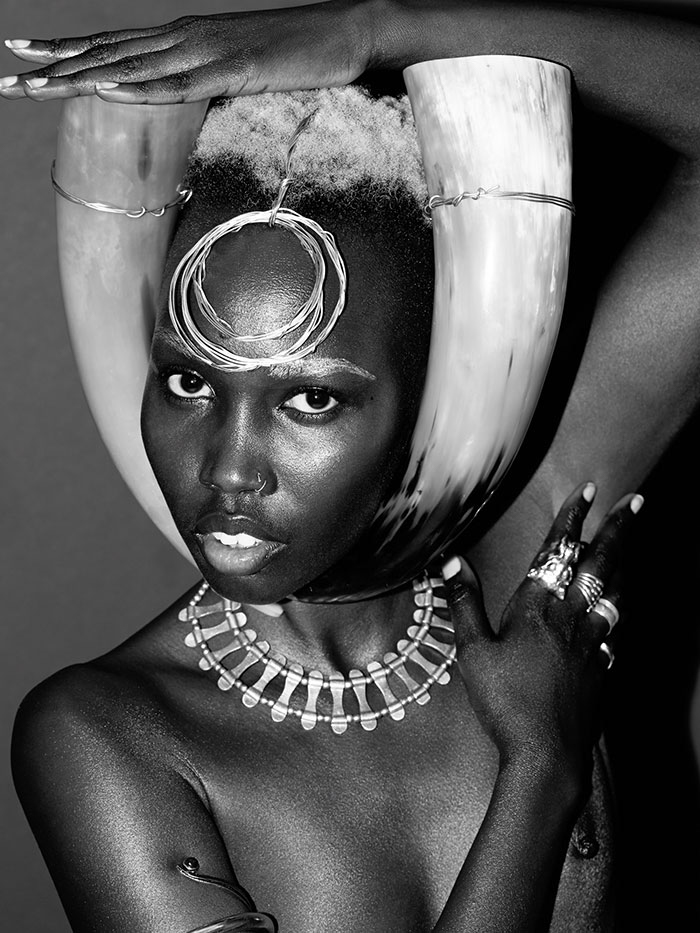
Mari Malek
S: Stand for Education. What’s it about and what’s the message there?
M: Stand 4 Education is a nonprofit that is dedicated to providing access to education for children and women–globally. Because every child who is in need deserves to have education. We are now focused on South Sudan because I’m from South Sudan and the girls in the images are all from South Sudan. We are all refugees who have risen above many adversities. So it makes sense for us to start with our country. Our country is facing one of the worst humanitarian crises in the world with many issues such as a lack of education, gender inequality, early child marriage, discrimination and war. 80% of our country is unable to read or write. It is the youngest country in the world. We are now 3 years old. We got our independence on July 9th, 2011. 51% of the country are children under the age of 18 so it’s very important we focus on the children because they are the future generation. 64% of our country are women. Ultimately, we want to build quality schools throughout South Sudan. But it doesn’t make sense for us to start building schools when there are schools that need help. When the time is right we also want to build boarding schools for girls where we bring these girls to live, protect them, help mentor them, and teach them about basic health, basic education, and also finding out what they are good at so that we can help them develop that. It’s also important to focus on girls because most of the girls get married off at a very early age and tend to lose their self-identity. Girls drop out as early as eight years old to prepare to become a woman. How do you know where you go at the age of eight years old? How do you even know your self-identity at that age? Education is the only way you can find who you are. As simple as reading a book, reading a sentence that can help you discover something. That’s basically what Stand 4 Education is: It’s about discovering, it’s about enlightening, it’s about knowing. And we choose to do it through different platforms like fashion, music and art–because we are creative beings.
S: How did you get involved? Can you tell me about the beginning process of Stand 4 Education?
M: I have always been a humanitarian. When I escaped from South Sudan with my family, my mom was always helping other refugees. So in our home we would have people come in and my mom would take care of them. She was a nurse. Until we left and came into the USA she continued to do those services for people–helping people. From there I discovered how much helping others is a part of my soul’s mission. I advocated with a few organizations including Unicef, which is all about helping and empowering children all over the world. They have been a tremendous help in South Sudan. All of the experience I received working with others as well as me being a refugee helped me to want to start Stand 4 Education. I started thinking what could possibly help my country the most right now? I did some research and found education is what is significantly needed in our home. Children do not have access to schools, and quality education is missing in South Sudan. Because of war many people were displaced and scattered or in refugee camps and their focus is to just survive. It would make someone’s day to just come to a refugee camp and bring these children coloring books to color or just bring them a notepad. To teach them the alphabet, you know? Those simple gestures are missing because of war.
S: These are things that a lot of the rest of the world can’t even imagine because it’s so simple–it’s like water.
M: Yes! Basic human rights. These are needs that we have in this world that are so unreachable in a third world. Coming from a third to first world country, I can see a significant amount of difference. At this point it’s not just about getting aid or bringing food: It’s about the individual helping themselves to become self-sufficient. We can never help anybody if they aren’t able to help themselves.
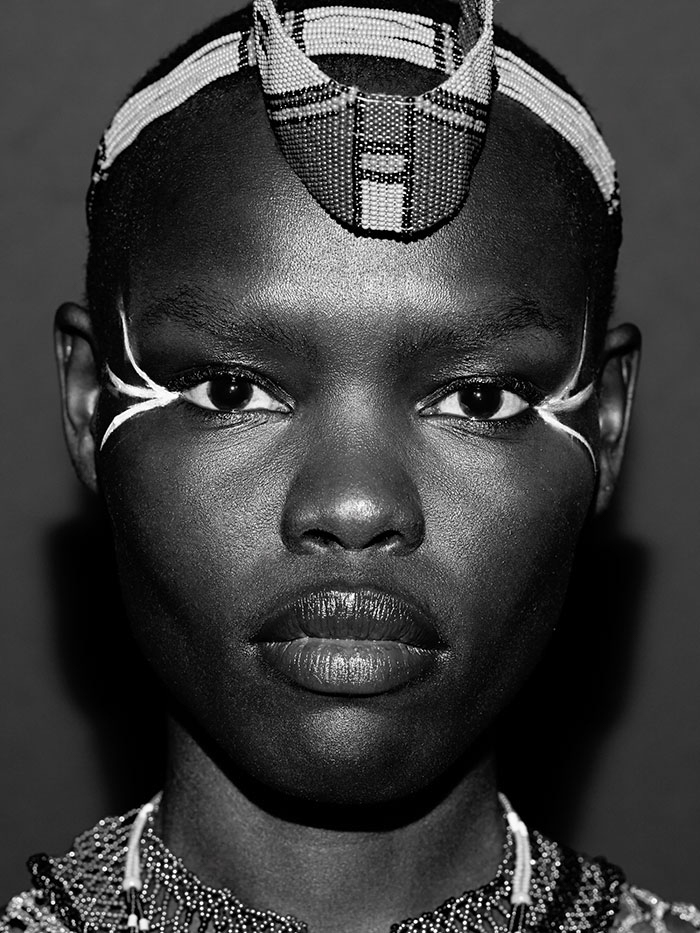
S: How are you going about building this school system that you spoke about?
M: The goal with Stand 4 Education is that we build an entire school system that is sustainable, that is of quality, that is adequate, that provides teachers, that provides school supplies and that provides lasting solutions and not just a temporary solution. Education can bring us peace! We will partner up with different schools and help them figure out what they need to get them going and keep them going. So far we’ve partnered up with two different schools in South Sudan. For example, the first school we partnered up with is called the Malek Primary School. Funny it’s my last name, too.
S: So…it’s not named after you, it just happened to be that?
M: It just happened, so funny. It’s not my school. It’s a school that we found that happened to be called the Malek Primary School. So I called them up and a woman who helped build the school is a woman from California and she has a nonprofit called Impact a Village. She had met some Sudanese refugees and learned about where they came from and what they needed. They were able to raise some funds to build the school. After the recent conflict that happened in South Sudan, which happened December 2013, the school got destroyed. All the children are gone. They’re living in refugee camps. Their families are either dead, displaced, or just unable to help themselves. Right now the school is empty. What we’re going to do with such schools is raise funds for them, advocate to bring teachers and school supplies as well as mentor some of the children. Fix it up and see how we can bring safety so the children can return back to school. The school has five classrooms and it started off with three hundred students, boys and girls. Since it was the only school in that village, more children and families started to send their kids there. The school ended up having up to six hundred or so children.
S: It’s a good thing they’re all showing up for school.
M: [laughs] Yes they were. The kids just want to learn. But there aren’t any teachers. Teachers are unreliable because there is not enough pay or there is no way to get around as far as transportation goes. Or they’re just not teachers, you know?
S: Can you briefly explain the situation that is going on in South Sudan?
M: Before South Sudan it was Sudan, the biggest country in Africa. For over two decades we have been going through a civil war. I was born in the 80’s during the second civil war. What happened is a conflict that has to do with religion, culture and differences of skin color. The Northerners started to enforce their religion upon everyone. And that’s what really caused the rift between the entire country. Slavery was happening and unfortunately it still happens. Villages were getting burned down. South Sudanese were getting targeted, being killed, being treated as less of beings. And that’s when the South Sudanese started to escape. There was a time where young boys and men were just being killed by the Northerners. Actually there’s a movie that just came out called the Good Lie, everyone should watch it. It basically explains all of that. Many young boys and children started to escape and walk for hundreds and thousands of miles from the villages in South Sudan to the refugee camps in Kenya. Many died along the way. Died of starvation, dehydration and disease. The few who made it got to the refugee camps in Kenya. The other South Sudanese that were in the north escaped to Egypt. When you stay in the refugee camp, whether you were in Egypt or Kenya, a system was developed like some sort of a lottery system where the refugees were being sponsored and brought into the USA. Some of us got lucky. A lot were left behind, a lot died and a lot are still in the camp right now.
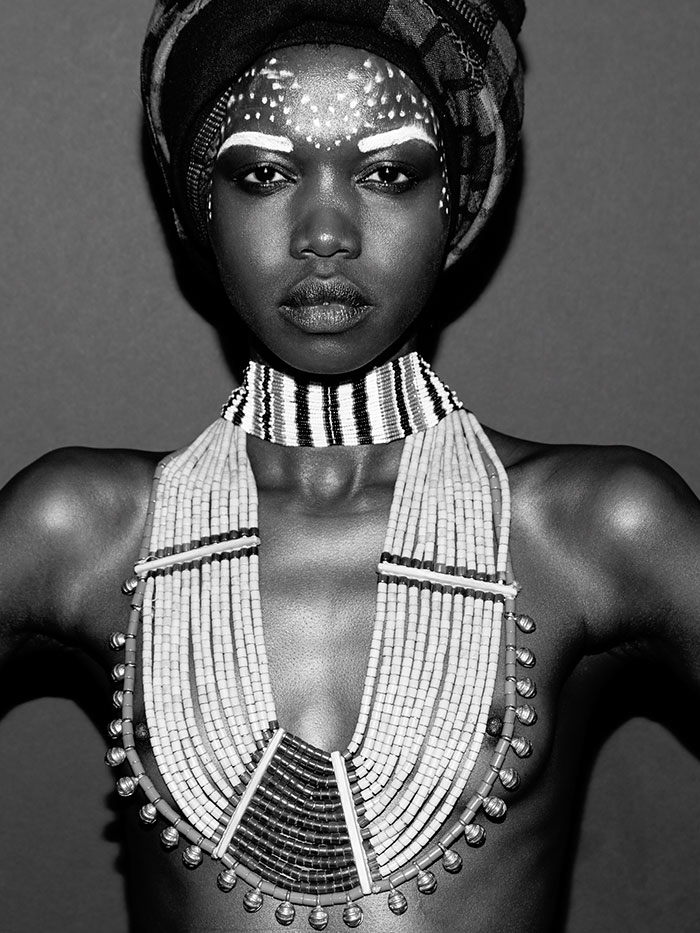
S: So your life could have been dramatically different had you not gotten lucky?
M: I could have been dead. I could have been married off with a ton of children. I could have became mentally ill, because some South Sudanese have post-traumatic disorders due to war. But I’m lucky. Even sitting with you right now here is almost emotional because…sorry…I’m getting emotional, but what are the odds that I’m one of the lucky ones to be able to sit here. I still have relatives who are in the camps or who have just died even after our independence. All I can do is really just do my best to tell their story because they don’t have a voice nor the platform I now have. The world needs to know this story because we are a planet of beings and there should never be any separation.
S: Would you like to tell a little bit about your story and experiences? At what age did you come over to the USA?
M: I came to the USA with my mother and two sisters when I was fourteen years old. In Sudan, our home was attacked and things got insanely intense and crazy. My mom decided to take us out of the country. She said, “Kids, I’m taking you three girls with me. It’s time for us to go.” Because my mom knew if we stayed, especially being girls, we’ll end up getting married off and losing ourselves. She went through that, too. My mom was married at thirteen. I had over twenty sisters and brothers from my father and we were all living in one home and my mom who was taking care of all of us.
S: How is that even possible?
M: Exactly. But it was possible. It was crazy, but fun. When holidays came around my father would get a bus for all of us to go somewhere to enjoy the holidays because there were so many children. When things started to get crazy with the war and the attacks she decided to leave. My father never left South Sudan. He stayed behind. We escaped and we ended up in a ship and took it to Egypt. We ended up staying there for four to five years until we got our sponsorship.
S: You were at a refugee camp that whole time just waiting?
M: Basically. All the refugees were living there. Egypt was a little bit different because we didn’t necessarily live in a camp or a tent and it was all Sudanese refugees in that area. We all just waited. Waiting until you get the sponsorship. It may never happen. Wait and wait. Within five years we got our sponsorship and my mom brought us here. You go through a situation where they interview you, they find out your story. You can even get your name changed so it’s easier to pronounce.
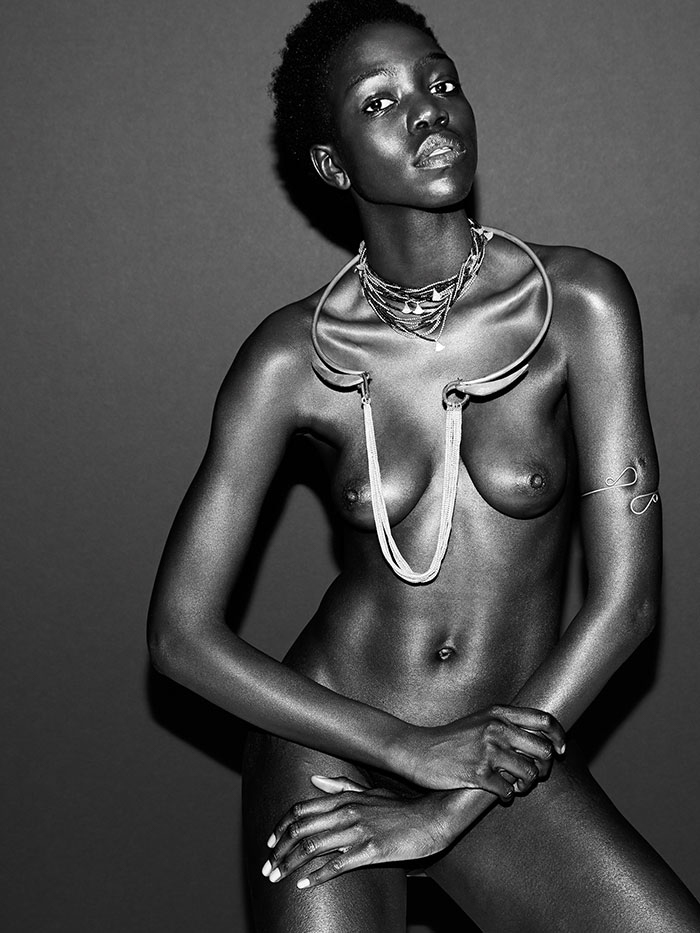
Nyamouch Girwath
S: Is your name the same?
M: Yes. Well, most of us have tribal names and American or Christian names. My tribal name is Adut and my other Christian name is Mari (which is also Mary). So we had to somewhat adjust our names and things like that. The place we got sponsored to was in Newark, New Jersey. We were living in the projects. Well, we didn’t know it was the projects, but we were living in the projects and there were crazy things going on around us, too, again.
S: So you went from one bad place to another different not-so-great scenario?
M: Yeah, we were very grateful no matter where we went because there was opportunity. Literally, America is the land of opportunity. Now we can go to school without having to be afraid that someone is going to kidnap us or marry me or kill us or rape us. It was a different scenario, but at the end of it all it’s another scenario where problems do exist in every part of the world. They just exist differently.
S: I imagine a lot of it stems from education…
M: Yeah! Again it goes back to education. Because if we know better, than we do better.
S: How did you get scouted and start modeling?
M: I was always teased about my skin color and how tall and skinny I was. It almost brought me to be self-hateful. Why am I this color? Why am I so skinny? Why am I not like the other kids? But that was a blessing in disguise because that’s what brought me into modeling. My unique strange “ugly” look [laughs]. I was working in the airport and people would see me and say things like, “Wow you should be a model!” I had no idea what that was for a long time. What is modeling? I looked into it, my cousin and I. My mom found relatives in San Diego so we moved to San Diego. That’s where I met my cousin and my cousin now is a supermodel. Her name is Atong Arjok. We went to a scouting in San Diego and we both got picked by so many different agencies that day. Atong was more bold than I was and she made the choice to start modeling right away. For me, I was a bit scared, my mom was adamant about school first. I waited until I was eighteen. I briefly started in Los Angeles and came to New York when I was twenty-one.
S: And now it’s going on nine years. So you also DJ and produce music–South Sudan’s first. How’d you get into that?
M: So in the modeling industry…I’m a unique personality for sure. I always change my hair and my look. Sometimes it’s extreme to the industry. They’ll be like, “Mari! You can’t be changing yourself so much–the clients!” But, honestly I’m very self-expressive so I think it works for me. I had to follow my heart. I got invited to so many cool parties and when I would go and I barely found any women DJs. That triggered the thought maybe I should be a DJ. After all, music got me through the toughest times. I looked into what I needed to do. I bought some equipment and I just started messing around with it and connecting with other DJs to help me figure it out. I wasn’t doing it so I could become a professional DJ. It was more like a hobby. From there it started to become its own thing, people would tell me, “Hey you’re DJ’ing now, you should do this party!” It just started to build into something and now I am getting more into it because I produce my own music. It’s evolving into something that I never expected. It’s also making me realize how I can help artists from my country by producing music for them. Which again ties back into why we want Stand 4 Education to use fashion, music and art in order to bring education. Because education is not only academic, it’s all aspects of life.

S: Have you gone back to Sudan? Is it an easy thing to say, “I want to fly to Sudan.” And then to arrange it?
M: I am going back for the first time since we left. It’s not that easy to just travel and especially to South Sudan.You need to have papers and safety. That’s why I haven’t been able to go back. I am a citizen of the USA now. I’m Sudanese-American. So now it’s easy for me to travel. I would like to document and film me going back for the first time with my colleague Mari Agory.
S: Which is confusing at first…
M: I know! Two Mari’s right? Mari Malek and Mari Agory. We want to go back this year together and document it. First of all, really visit the schools that we are helping and connect with our own people. The children back home need to see that their own people care. That will be empowering. They’re used to seeing many foreign activists coming to aid them. I think it will be a very important message to let our people know that we are here too, that the African Diaspora is involved . We want to empower our people to know that we are in it together. We were able to rise above all the difficulties. If we can make it you can make it too.
S: Let’s talk about the project that you did with Cliff Watts for Stand 4 Education. What was the thought process behind that?
M: I was thinking how can I make an impact and raise a high level media attention to bring awareness to what is happening in South Sudan now. The media barely talks about it. We are facing a famine! The thought came to my head–duh! You’re a model, you have a platform, use it! The Sudanese models here are the face of South Sudan. We are the voice for the voiceless. As a sisterhood, let us stand together and bring awareness. Agory and I started contacting the girls and decided we should do a powerful photo series to demand attention. We were like, “Yeah!” We want the world to know. Although our country is war torn, there still lies beauty. This photo project is really about us educating the world about where we come from. And educating in all different aspects of life whether you are an artist, a politician, a mom, or an activist. We wanted to open a dialogue with the world on South Sudan. Women, men, walk around the village naked decorated in beautiful beaded jewelry that they make. It’s so beautiful. And we are dark-skinned people of color who have been conditioned and told that our skin is ugly. Let’s embrace that. We wanted a photographer who was aligned with the vision. The perfect person that came to mind was Cliff. I told him about where we come from and how we wanted to capture that as well as demanding that media attention. He said, “This is fucking beautiful. Let’s do it.”

Rina Kara
S: One of my questions was going to be: how do you intend to keep the interests piqued of those you are trying to reach? How do you keep the interest of people who now are so fragmented? But then again I don’t think its about trying to reach everyone, as you said.
M: You can’t force people to listen or do anything. All you can do is your best to spread the message and whoever is meant to receive it–will receive it. It’s for those who really want to listen. It’s for those who really want to make a change in the world.
S: If someone wants to help and reach out what do they do?
M: If someone wants to help they can reach us our website is: www.stand4education.org. Our main thing is to get people involved by purely just wanting to be involved. It’s not about giving us money, it’s about how can we work together. How we can stand together and stand up for our basic human rights. We highly believe in collaborations! Of course we take donations and we are looking for sponsors for our coming events and projects. We are using fashion, music and art as a platform to spread the message.
S: Whatever you have to offer.
M: Yes. What can we as individuals do to make a change? I donate my time and music towards our cause. I truly believe in it. And I want to be the example of what I’m saying.
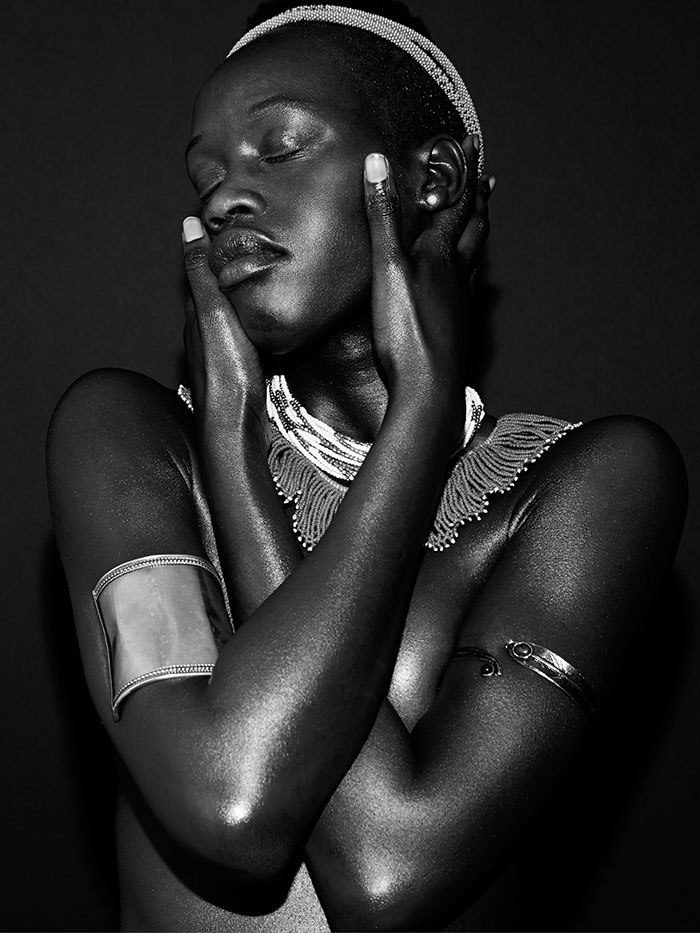
Elizabeth Arjok
Photographer – Cliff Watts
Creative Direction: Mari Malek
Producer – Ashley Owens
Casting – Julia Samersova
MUA – Lanea Singleton
Styling – Dapper Afrika
Jewelry – Silly Simone, Martine’s Dream
Ta Meu Bem Jewelry
Shot at Dune Studios







